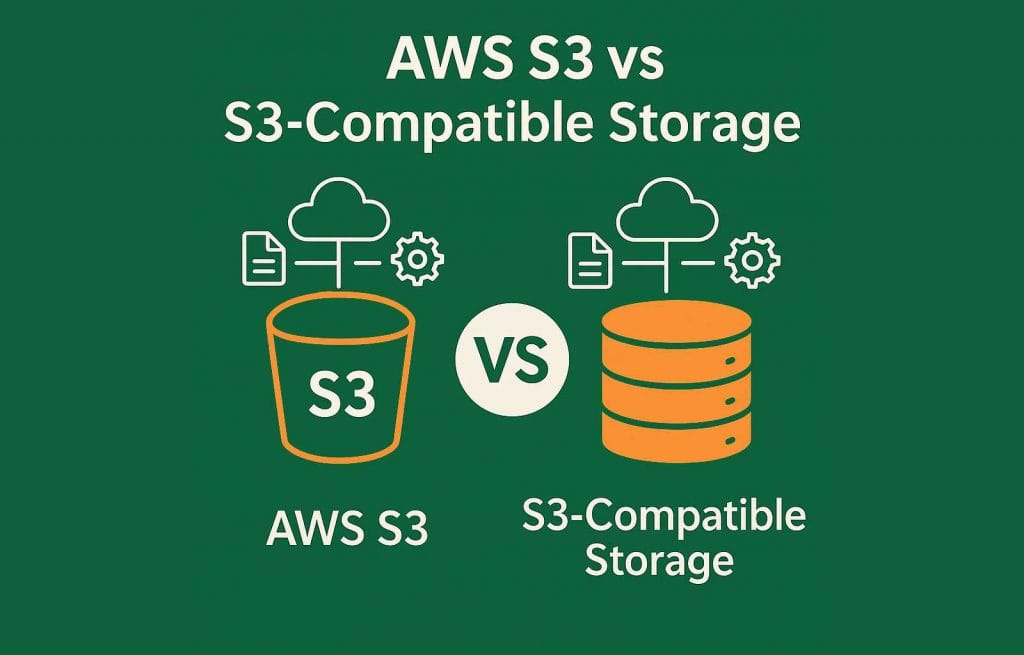AWS S3 vs S3 Compatible Storage
AWS S3 vs S3-Compatible Storage: Which One is Right for Your Business?
When it comes to cloud storage, Amazon S3 (Simple Storage Service) is often seen as the industry gold standard. But with rising costs and concerns about data sovereignty, many organisations are now exploring S3-compatible storage as a flexible and cost-effective alternative.
In this post, we’ll explore what AWS S3 offers, what S3-compatible storage means, and the pros and cons of each to help you make an informed decision for your cloud strategy.
What is AWS S3?
Amazon S3 is an object storage service that allows users to store and retrieve unlimited amounts of data from anywhere on the internet. It’s widely used for:
Website and app data hosting
Data backup and disaster recovery
Archiving and long-term storage
Analytics and machine learning
Media content delivery
With 11 nines of durability (99.999999999%), AWS S3 offers high availability, scalability, and native integration with other AWS services like EC2, Lambda, and Glacier.
What is S3-Compatible Storage?
S3-compatible storage refers to storage solutions that implement the Amazon S3 API, meaning they work seamlessly with existing S3 tools, SDKs, and integrations.
This allows you to enjoy S3 functionality — including bucket creation, object storage, versioning, and access policies — on alternative platforms that may be more cost-effective, compliant, or sustainable than AWS.
✅ PeaSoup S3, for example, offers a UK-based S3-compatible solution designed for businesses that need secure, eco-conscious cloud storage without vendor lock-in.
AWS S3: Pros and Cons
✅ Pros
Global reach with high redundancy and availability zones
Seamless AWS integrations for compute, analytics, AI, and security
Scalable on demand with no infrastructure management
High durability and reliability
Comprehensive security and compliance features
❌ Cons
High and unpredictable costs, especially for data egress
Complex pricing tiers (storage, requests, replication, transfer)
Vendor lock-in within the AWS ecosystem
Limited control over data residency and sovereignty
S3-Compatible Storage: Pros and Cons
✅ Pros
Lower and predictable pricing
Flexible deployment options (private, public, hybrid)
Data sovereignty, ideal for UK and EU compliance (e.g., GDPR)
No vendor lock-in, reducing long-term dependency
Compatible with S3 tools and workloads out-of-the-box
Sustainable options available, such as fanless immersion-cooled data centres
❌ Cons
Limited native integrations compared to AWS
Scalability depends on the provider’s infrastructure
Support and SLAs may vary between vendors
When to Choose AWS S3 vs S3-Compatible Storage
| Use Case | AWS S3 | S3-Compatible Storage |
| Deep AWS integration needed | ✅ | ❌ |
| Cost-effective backup/archive | ❌ | ✅ |
| Strict data residency (UK/EU) | ❌ | ✅ |
| High-performance global delivery | ✅ | ❌ |
| Custom SLAs or private cloud | ❌ | ✅ |
| Eco-conscious storage strategy | ❌ | ✅ |
Conclusion: The Right Cloud Storage for Your Needs
AWS S3 remains a robust choice for enterprise-grade scalability and integration. But if your business values cost control, data compliance, and flexibility, then S3-compatible storage is a compelling alternative — especially when provided by trusted cloud platforms based in the UK or EU.
With the same API and tool support, you can switch or complement AWS S3 with a greener, more compliant solution — without changing how your apps work.
✅ Explore S3-Compatible Storage with PeaSoup
Looking for an AWS S3 alternative that’s cost-effective, UK-hosted, and powered by green technologies?
Discover PeaSoup S3-compatible storage — perfect for backup, archive, NAS extension, and Microsoft 365 protection. All the benefits of S3, without the high costs or compliance headaches.

